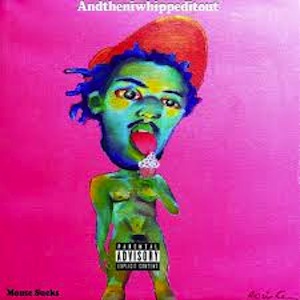If the “sophomore album slump” is real, then 23-year-old rapper and producer Mouse Sucks must not know about it. From the first bass note in “CheyannedidmeDirty,” to the last dying chord in “401 East End,” he delivers an eccentric and unique project that stands out in today’s fairly predictable hip-hop landscape. Hailing from Toronto, the young artist crafts subtle instrumentals laced with carefree lyrics and dark flows in Andtheniwhippeditout, his second album in as many years.
Looking at his social media presence, you can almost get a sense of Mouse Sucks’ style and persona. The comical life observations and sentenceswithoutspaces littering his Twitter feed are matched sonically on his album, in a surreal but tasteful way. Even more impressive is the fact that all of the beats featured on this project were produced by the Ontario resident himself. For an LP running only 28 minutes long, it features an admirable aural assortment of instrumentals, with beats that sound like smooth elevator music put through a blender, trap-flavoured MIDI recitals, and even a song that samples the twangy banjo of a country tune.
None of these attributes would matter, however, without the entrée — the actual rapping — and fortunately Mouse delivers. Though his lyrics are no match for literary greats like Dostoevsky and Lil Wayne, he delivers some fun bars that are enough to keep the listener engaged and moving. On tracks like “Debbies,” he even uses some clever wordplay, “Swimming in my Polo / That’s chicken / Not Marco.” That being said, while this track is arguably the project’s strongest due to its great features and brooding flows, it also exposes one of its few weaknesses: inconsistent mixing between the featured artists. The charming and relatable low-fi, bedroom-recording sound of the album is jarringly amplified at times when certain features come on, creating an experience that can possibly disconnect the listener from the music.
Aside from this oversight, the project has a distinct audible DNA that is an impressive evolution and continuation of his humble roots. Seemingly at a crossroads between the trendy Soundcloud rap that has been dominating the genre’s zeitgeist, and more established mainstream hip-hop, Mouse Sucks constructs a puzzle whose pieces should not interlock under conventional wisdom. Yet with the exception of some minor gripes, he delivers a strong project that will undoubtedly be influential in defining his sound and that will help him carve his name in the shifting sands of Canadian hip-hop.


